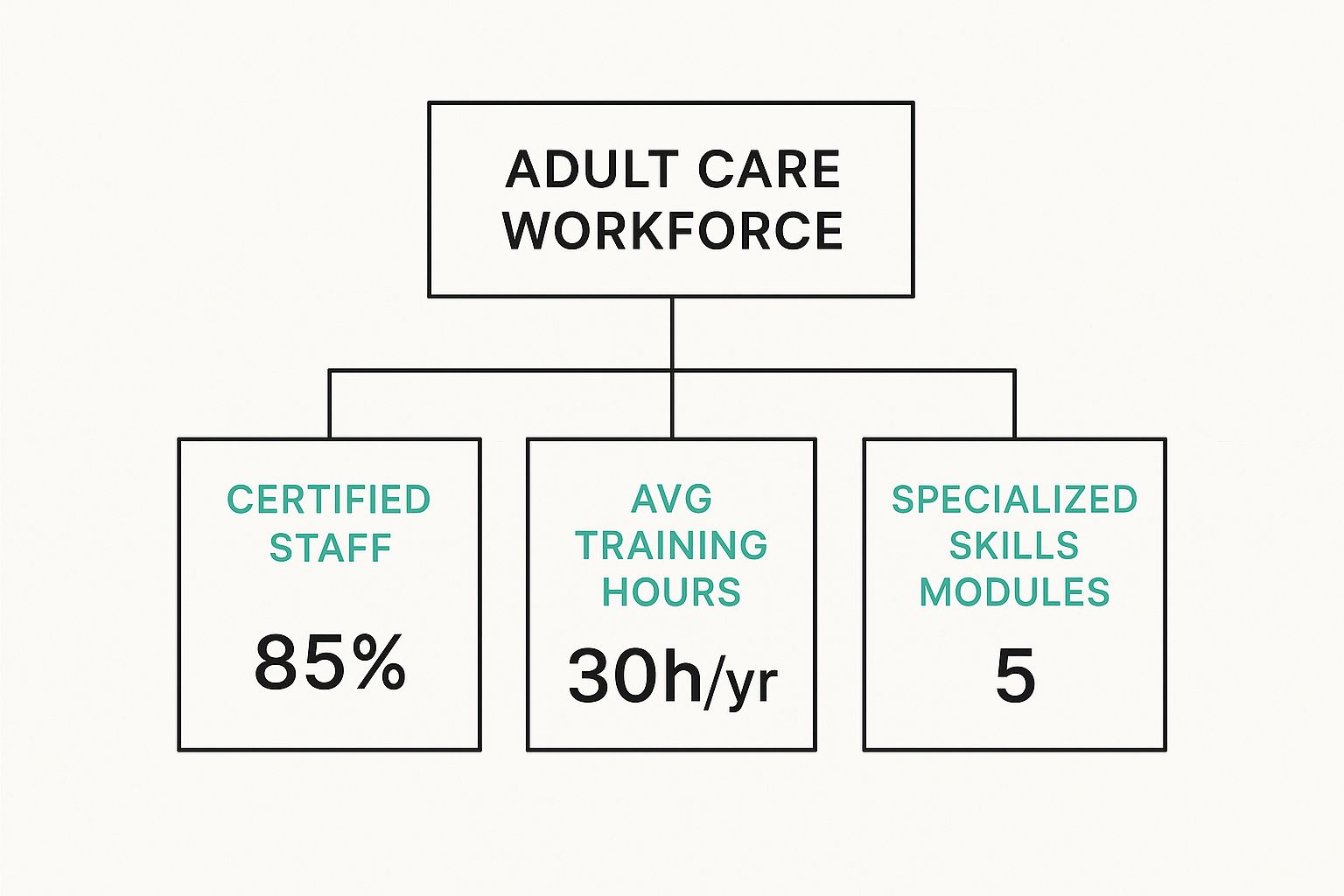
Ever wondered what a career that truly makes a difference looks like? At its heart, adult health and social care is all about providing the support people need to live with dignity and as independently as possible. It’s a rewarding blend of practical help with daily life and the crucial emotional support that empowers adults facing challenges from age, illness, or disability. The real focus? Helping them maintain and improve their quality of life.
If you’re looking for a stable career path where you can see the positive impact of your work every single day, you’ve come to the right place. This guide will walk you through what adult care involves, why it’s such a fulfilling profession, and how you can get started.
Understanding Adult Health and Social Care

Think of adult health and social care as a personalised toolkit for living well. Inside that kit, you’ll find all the specific tools an individual might need to navigate their daily challenges—whether that’s a helping hand to get dressed, a reminder to take medication, or simply a friendly face to chat with and keep loneliness at bay.
This field is built on a foundation of human connection. It reaches far beyond just ticking off medical tasks; it’s about seeing and supporting the whole person. The ultimate goal is to empower adults to live the life they choose, as fully as they can, by respecting their decisions and championing their wellbeing. That might mean helping someone continue living safely in their own home, providing support in a residential setting, or enabling them to get out and be part of their local community.
What Does This Support Look Like?
Because everyone’s situation is unique, the support offered is incredibly varied. One person might need intensive, around-the-clock assistance, while someone else might just need a helping hand for a couple of hours each week. It’s all tailored to the individual.
To give you a better idea, here's a breakdown of the core areas where support is often provided.
Core Components of Adult Health and Social Care
| Type of Care | What It Involves | Who It Helps |
|---|---|---|
| Personal Care | Assisting with daily routines like washing, dressing, and eating. | Individuals with mobility issues, frail older adults, or those recovering from illness. |
| Practical Support | Helping with household tasks such as shopping, cooking, and cleaning. | Anyone who finds it difficult to manage the practical demands of running a home. |
| Health Support | Assisting with medication, attending appointments, and monitoring health conditions. | People with chronic illnesses, disabilities, or complex medical needs. |
| Social & Emotional Support | Providing companionship, organising social activities, and offering a listening ear. | Those experiencing loneliness, social isolation, or mental health challenges. |
This holistic approach ensures that care isn't just about surviving—it's about thriving. To get a deeper sense of what's involved, our article on what is adult care is a great place to start.
The Growing Need for Quality Care
The demand for skilled, compassionate care professionals is huge and it's only set to increase. Yet, recent data reveals a tough reality. Over the last two decades, the percentage of adults in England receiving long-term social care funded by the public has dropped from 2.3% in 2003/04 to just 1.4% in 2023/24. This trend is especially stark for older adults, where access has been cut by more than half.
This gap highlights just how crucial a well-trained, professional, and properly regulated workforce is. Part of understanding adult social care is appreciating the role of regulatory bodies. They exist to make sure high standards are met, which protects both the people receiving care and the dedicated workers providing it. It’s why you’ll often see providers proudly state they offer services regulated by the Quality Care Commission.
Ultimately, choosing a career in this field is about making a real, tangible difference. You become the person who brings comfort, enables independence, and gives someone a sense of security and dignity. You become a vital part of a system that our society simply couldn't function without.
Why a Career in Adult Care is So Rewarding

When you’re considering a career, it’s often a toss-up between paying the bills and finding something you genuinely love. In adult health and social care, you don’t have to choose. It’s one of those rare fields where the practical and the personal come together, offering a job that’s not just stable but deeply fulfilling. This is a career where you can go home every day knowing you made a real, positive difference in someone’s life.
Think about what that actually means. You could be the person who helps an older gentleman find the confidence to walk to the shops again after a fall. Or perhaps you're the calm, steady presence that enables a young adult with a disability to move into their own flat for the first time. These aren't just tasks on a checklist; they're life-changing moments that build independence and restore dignity.
The Power of Human Connection
At its heart, a career in care is about relationships. You become a familiar, trusted face in someone’s life, often when they’re at their most vulnerable. It’s this unique bond that so many people in the profession say is the biggest reward.
You’re the one who greets them with a smile in the morning, the patient ear for their stories, and the professional who keeps them safe and well. It takes a huge amount of compassion and resilience, but what you get back is a sense of purpose that you’d be hard-pressed to find in a typical 9-to-5.
A career in adult health and social care is less about what you do and more about who you are for someone else. It's the commitment to being a source of comfort, stability, and encouragement that defines the role and makes it so incredibly fulfilling.
A Day in the Life: A Story of Impact
To really get a feel for it, imagine a day as a support worker. It might start with helping a client with their morning routine, making sure they feel comfortable and ready to face the day. A bit later, you might accompany someone else to a doctor's appointment, acting as their advocate and a source of reassurance.
The afternoon could involve anything from organising a fun social activity in a residential home to simply sharing a cup of tea and a chat with someone who’s feeling lonely. Every single one of these actions, no matter how small, adds up to a bigger picture of support and empowerment. For a glimpse into the emotional side of this work, you can explore personal stories of resilience and care which truly bring the real-world impact to life.
Tangible Rewards Beyond the Paycheque
While the emotional satisfaction is huge, the practical benefits are just as strong. The adult care sector is a cornerstone of our society and it’s always growing, which means you get a level of job security that’s hard to come by these days.
The key benefits really stack up:
- Job Security: Demand for qualified care professionals is consistently high and set to keep rising, offering fantastic long-term stability.
- Career Progression: This isn't a dead-end job. With the right training and experience, you can move into senior, specialist, or management roles.
- Making a Real Difference: Every day, you see the direct result of your hard work in the improved quality of life of the people you support.
It's rare to find a career that offers both a stable future and the chance to make such a tangible difference. If you want to dive a little deeper, read our article on the rewards of a career in health and social care.
Exploring Different Roles in Adult Care
When people hear "carer," they often picture just one type of job. But the world of adult health and social care is so much bigger than that! It's a massive field packed with different roles, each with its own unique challenges and rewards. Knowing what's out there is the first step to figuring out where you might fit in best.
From helping someone with their daily routine to managing an entire residential facility, the opportunities are incredibly varied. This isn’t just about finding a job; it’s about building a career.

There’s a real focus on making sure staff are well-qualified, highlighting just how seriously training and development are taken in this sector.
Frontline and Community-Based Roles
Most people start their journey in a frontline role, working directly with individuals who need support. These jobs are the absolute backbone of the sector.
A Care Assistant is a classic example. You'll often be the main point of contact, working in a care home or visiting people in the community. Your day could involve:
- Helping with personal care, like washing and getting dressed.
- Assisting with mobility to keep people safe and active.
- Offering vital companionship and a friendly ear.
Then you have the Support Worker, whose focus is more on empowering people to live as independently as possible. One day you might be helping with household budgets, and the next you could be supporting someone to join a local club. It's an essential role for helping people with disabilities or mental health challenges live the life they want.
Stepping into Leadership and Management
Once you’ve got some experience, plenty of doors will open for you to move up. The Senior Care Worker role is a natural next step. It’s the perfect blend of hands-on care and new responsibilities, like supervising a team, developing individual care plans, and acting as a key contact for families.
If you’ve got your sights set even higher, becoming a Care Home Manager is a significant leadership challenge. You'd be responsible for everything – from managing staff and budgets to making sure the home meets all required safety and care standards.
The adult care sector is not just growing; it's thriving with opportunities. This growth creates a stable career ladder, allowing dedicated professionals to move from entry-level positions to influential leadership roles.
Career Paths in Adult Health and Social Care
To help you see how these roles connect, here’s a quick comparison of some common career paths.
| Job Role | Key Responsibilities | Typical Entry Qualification |
|---|---|---|
| Care Assistant | Provides direct personal care, mobility support, and companionship to individuals in their homes or residential settings. | Level 2 or 3 Diploma in Health and Social Care is common, but employers also value experience and personal qualities. |
| Support Worker | Empowers individuals with disabilities or mental health needs to live independently by assisting with daily tasks and community integration. | Often requires a Level 2 or 3 Diploma, with a focus on person-centred support. |
| Senior Care Worker | Supervises care teams, develops care plans, administers medication, and liaises with families and healthcare professionals. | Typically requires a Level 3 Diploma and significant hands-on experience in a care role. |
| Care Home Manager | Oversees all operational aspects of a residential home, including staff management, budgeting, and regulatory compliance. | Often requires a Level 5 Diploma in Leadership for Health and Social Care and extensive management experience. |
The demand for skilled, compassionate people is booming. In England alone, the adult social care workforce recently hit a new high, employing around 1.60 million people. That’s an increase of 52,000 jobs in just one year. You can read the full analysis of the workforce data from Skills for Care to get a sense of just how big this expansion is. By understanding the different pathways, you can map out a future that fuels your passion for helping others.
Your Pathway to a Career in Care with Stonebridge College
Feeling inspired? Getting the right qualification is your launchpad into a rewarding career in adult health and social care. It’s the formal recognition of your skills, showing employers you have the knowledge and dedication needed to provide excellent support.
At Stonebridge College, our accredited online courses are specifically designed to help you build your career from the ground up or climb to a leadership role. Let’s look at two brilliant qualifications that can be your stepping stones.
Building Your Foundation: Level 3 Diploma in Adult Care (RQF)
For anyone new to the sector or looking to formalise their experience, the Level 3 Diploma in Adult Care (RQF) is the perfect starting point. Think of this course as your practical toolkit, equipping you with the confidence and competence to excel in a frontline role.
The curriculum covers vital topics to prepare you for the realities of the job. You will learn about:
- Person-Centred Care: Mastering the art of creating support plans that respect individual choices and needs.
- Health and Safety: Understanding the crucial procedures for safeguarding yourself and the individuals you support.
- Effective Communication: Developing the skills to build trust with service users, their families, and other professionals.
- Promoting Wellbeing: Learning how to support individuals in a way that enhances their physical, emotional, and social health.
Completing this diploma opens the door to roles like Care Assistant, Support Worker, or Senior Care Worker. If you're wondering how to get started, our guide on how to get into health and social care offers excellent practical advice.
Advancing to Leadership: Level 5 Diploma in Leadership and Management for Adult Care (RQF)
Are you an experienced professional with ambitions to lead and inspire? The TQUK Level 5 Diploma in Leadership and Management for Adult Care (RQF) is designed just for you. This advanced qualification moves beyond direct care, focusing on the strategic skills needed to manage a care service effectively.
This diploma is your bridge to senior positions like Registered Manager or Care Home Manager, demonstrating your capability to lead a team, manage resources, and ensure the highest standards of care.
This Level 5 qualification isn't just a certificate; it's a statement of your readiness to shape the future of care. It equips you with the strategic vision to lead with confidence and make a lasting impact.
Key areas of study include:
- Leading and Managing a Team: Developing effective strategies for recruitment, supervision, and professional development.
- Managing Resources and Budgets: Gaining the financial acumen needed to run a sustainable and efficient care service.
- Ensuring Quality and Compliance: Mastering the regulatory requirements and best practices to deliver outstanding care.
- Strategic Planning: Learning to develop long-term goals that improve service delivery and outcomes.
With these qualifications from Stonebridge College, you can build a career path that aligns with your ambition, whether you're just starting out or aiming for the top.
How Online Learning Fits Your Life

Thinking about a new qualification can feel overwhelming when you’re already juggling work and family. This is where the beauty of online learning comes in, letting you chase your career goals in adult health and social care without hitting pause on your life.
Here at Stonebridge Associated Colleges, our entire approach is built around you. With over twenty years of experience, we deliver career-focused programmes that are 100% online, giving you the freedom to learn whenever and wherever it works.
Financial Flexibility Without the Pressure
One of the biggest hurdles to education is often the cost. We've removed that stress with a simple, flexible subscription-based system. This model is designed to put you in control of your finances without locking you into a long-term credit agreement.
- Affordable Monthly Fee: Pay a manageable amount each month, making it easier to budget for your studies.
- No Long-Term Contracts: You’re not tied into a lengthy financial commitment.
- Pause or Cancel Anytime: If your circumstances change, you have the freedom to pause your subscription or cancel it. No questions asked.
This approach ensures your education fits your financial situation, not the other way around.
Personalised Support Every Step of the Way
Studying online doesn’t mean studying alone. Every learner gets personalised support from a qualified tutor who is there to offer feedback, answer questions, and provide encouragement when you need it most. This blend of independent study and expert guidance gives you the best of both worlds.
A Trusted and Accredited Path to Your Career
Choosing an online provider is a big decision. Stonebridge is accredited by the UK Register of Learning Providers and regulated by the Financial Conduct Authority, so you can study with complete peace of mind, knowing your qualification will be recognised and valued by employers.
With Stonebridge, you are choosing a convenient, affordable, and trusted route into your new career. Our rigorous academic standards and transparent financial model give you the confidence to invest in your future.
By combining total flexibility, one-on-one support, and trusted accreditation, we offer a learning experience that truly fits around your life.
Common Questions About Adult Care Careers
Taking the leap into a new career in adult health and social care always brings up questions. Here are some clear, straight-up answers to help you make a confident decision about your future.
Do I Need Previous Experience to Start?
Not always! While experience is a bonus, most employers are far more interested in your personal qualities. They're really looking for people who show:
- Empathy and Compassion: A genuine desire to help others.
- Patience and Resilience: The ability to stay calm and supportive.
- A Willingness to Learn: Being open to picking up professional skills.
Of course, having the right qualification makes a huge difference. A course like the Level 3 Diploma in Adult Care (RQF) is designed to build your skills and confidence from scratch, making you a strong candidate even if you haven't worked in care before.
What Does a Typical Day Look Like?
Honestly, there’s rarely a "typical" day in adult care. The only constant is that your work is person-centred, meaning everything you do is built around the unique needs of the people you're supporting. A day might involve a mix of personal care, health monitoring, practical support, and—most importantly—companionship. The variety keeps you on your toes and means no two days are ever quite the same.
What Are the Career Progression Opportunities?
The opportunities to move up in adult care are fantastic. A common career path looks a bit like this:
- Entry-Level Role: Start as a Care Assistant or Support Worker to get vital hands-on experience.
- Senior Role: With experience and a Level 3 qualification, you could become a Senior Care Worker or Team Leader.
- Management Role: An advanced qualification like the TQUK Level 5 Diploma in Leadership and Management for Adult Care (RQF) can open doors to top-level jobs like Care Home Manager.
The path for moving up in adult care is clear and very achievable. It’s a career that rewards hard work and a passion for learning, letting you go from a frontline role to a position of real leadership.
Is Online Learning Effective for This Field?
Absolutely. Modern online courses from trusted providers like Stonebridge are just as thorough as classroom learning. You'll cover all the essential theory with practical case studies, and you’ll have expert tutors on hand to guide you. The flexibility of online study makes changing your career a realistic goal you can actually manage.
The demand for skilled care professionals is growing fast. In England alone, the number of people getting long-term adult social care support went from 659,000 to 671,000 in just one year. You can learn more about these adult social care statistics on GOV.UK. Gaining a qualification is your first step to becoming part of this essential workforce.
Ready to start your journey in adult health and social care? At Stonebridge Associated Colleges, we offer flexible, accredited online courses designed to fit your life. Explore our Level 3 Diploma in Adult Care to build your foundation or our Level 5 Diploma in Leadership to advance your career.




